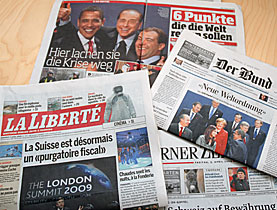
Switzerland dealt poor cards at G20 summit

Swiss newspapers are cautiously optimistic that commitments made at the G20 summit will boost the global economy, but agreed that Switzerland will be among the losers.
Commentaries in Friday’s papers devoted as much space to dissecting the promises made by government leaders at the summit in London, as they did to attacks on so-called tax havens like Switzerland.
The Neue Zürcher Zeitung (NZZ) was the most negative regarding the promises made in the final communiqué. It said there were few “confidence-building” measures included in the document.
“The final declaration of such summits consists of promises which are quickly forgotten… or at best, empty. Reading all the good things in the London communiqué that are to be implemented makes one dizzy, as does the celebration of the homey ‘we’ feeling: ‘We commit’, ‘we reaffirm’, ‘we are resolved’. There is no end to it…”
The NZZ admitted there was optimism that something good may come of the commitment to strengthen the International Monetary Fund, and to tighten hedge fund regulation.
However, it said an attempt to regulate manager salaries was nothing more than populism, as was the attack on “uncooperative jurisdictions, including tax havens. This does little to combat the crisis or the problems of access to credit.”
The Bern-based Bund was a little more optimistic, although it too remained cautious.
“A one-day conference bringing together heads of state and governments will not save the world.” It said the main benefit of a summit of this kind is to focus attention and send a message to the world that governments are doing something.
No surprises
“There were no surprises in the final communiqué, but that is not necessarily bad. The most concrete measure is the welcome tripling of funds made available as credits to poor countries and the injection of money in the financial trading system,” added the Bund.
Zurich’s Tages-Anzeiger went even further, saying that the commitments included in the G20 declaration would have been “unthinkable” only a short time ago. “In principle, the G20 has declared the engine that has driven the economy and politics for 20 years – the finance industry – has broken down.”
“A new game has begun,” it concluded. “With new rules, risks and winners. Those who profited previously (like Switzerland) have – unfortunately – been dealt poor cards.”
The Basler Zeitung devoted space to the fact that Switzerland was placed by the Organisation for Economic Co-operation and Development (OECD) on a “grey list” of countries that have said they will comply with rules on sharing tax information but have not yet acted.
Black and grey
“The G20 did not place Switzerland on its black list [of uncooperative countries]. But the coup was only partly successful,” it said.
“The German chancellor, Angela Merkel, and the French president, Nicolas Sarkozy, were successful in placing Switzerland on a ‘grey list’, to keep a watch on the country.” The Basler Zeitung pointed out as well that the threat of being moved from the grey to the black list remains, if Switzerland does not act.
“The birth of a political giant” was the headline of the commentary of Geneva’s Le Temps. “It reflects a political turning point. The G20, all specialists agree, is now the new arbiter of the planet’s economic ills, as well as commercial and financial interests. This does not mean, of course, that the United Nations Security Council or the G8 will be relieved of their responsibilities.”
Le Temps agreed that Switzerland had come out at the losing end, and that there was a lot of distrust of the Swiss banking centre. But the paper said the new global rules to ensure an even playing field could also work in Switzerland’s favour.
“The desire for international transparency can be a weapon of the confederation – to demand justice and fairness.”
“Switzerland is now a fiscal purgatory,” was the headline on the front page of Fribourg’s La Liberté.
“Switzerland finds itself more than ever under pressure even if it escapes the worst. The last words of the British prime minister [Gordon Brown] should be remembered: ‘This is a recognition that the old tax havens have no place in this new world’.”
swissinfo, Dale Bechtel
The Group of 20 first met in Berlin in December 1999. It was created as a response to the Asian financial crisis of 1997-98, which exposed the need to bring emerging market nations into the core of global economic discussion and governance.
The G20 represents around 90 per cent of global gross national product, 80 per cent of world trade (including EU intra-trade) and two-thirds of the world’s population.
The Group met in Washington on November 15 and agreed a plan to try to restore global growth and bring order to a financial system reeling from the worldwide credit crisis.
The leaders pledged to “work together to restore global growth” but stopped short of any coordinated new fiscal measures, saying spending policies should be used to stimulate domestic demand rapidly, as appropriate for each country.
The Swiss parliament has agreed two stimulus packages worth SFr1.6 billion in response to the economic crisis.
A first package to the tune of SFr980 million to boost private investment and prevent job cuts was agreed last year.
The second stimulus package worth SFr710 million agreed in March mainly targets infrastructure projects for road and rail. It also includes credits for research, energy, environment and tourism.
The government is due to decide in June on a third programme if the economic downturn continues.

In compliance with the JTI standards
More: SWI swissinfo.ch certified by the Journalism Trust Initiative


























You can find an overview of ongoing debates with our journalists here . Please join us!
If you want to start a conversation about a topic raised in this article or want to report factual errors, email us at english@swissinfo.ch.